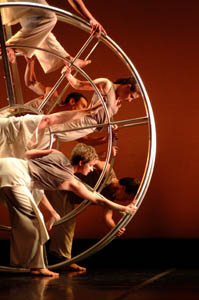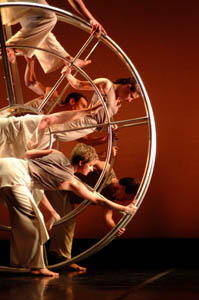Swarthmore College
http://www.swarthmore.edu/dance.xml
Dance Program Spring 2010 Courses
Click here for a link to a PDF of this information
Dance 004 – The Arts as Social Change. 1.0 Credit
(Cross-listed as MUSI 006)
This course aims to bring together students with an interest in investigating and investing in social change work through the arts. Our seminar community will engage in discussion of readings and video viewings, will host and visit local leaders from the arts and social change movement, and will engage in fieldwork opportunities as required parts of the course. Papers, journals, and hands-on projects will all be included.
Friedler. T/TH, 2:40PM – 4:00PMLang Center 106
Dance 008. Anatomy: Bones, Muscles, and Movement. 0.5 Credit
(Cross-listed as MUSI 008B)
An introduction to the musculoskeletal system through the exploration of the body in stability (topography) and in motion (kinematics), within the range of dance, music, yoga poses, and daily life. Reading and video viewing, in-class presentations, and a final paper required. Open to all students without prerequisite.
Hess. W, 1:15PM – 4:00PM. LPAC 2
Dance 013. Dance Composition: Tutorial. 0.5 Credit
The student enrolling for a tutorial will enter the semester having identified a choreographic project and will be prepared to present material weekly. Projects in any dance style are encouraged. All students proposing tutorials are advised to discuss their ideas with a member of the dance faculty before enrollment. Choreography of a final piece for public performance is required, as are weekly meetings with the instructor and directed readings and video and concert viewings. A journal may also be required. Prerequisites: Dance 011 or its equivalent. A course in dance technique must be taken concurrently.
Staff. TBA
Dance 079. Dancing Desire in Bollywood Films. 1 Credit
This course will explore the shifts in sexuality and gender constructions of Indian women from national to transnational symbols through the dance sequences in Bollywood. We will examine the place of erotic in reconstructing gender and sexuality from past notions of romantic love to desires for commodity. The primary focus will be centered on approaches to the body from anthropology and sociology to performance, dance, and film and media studies. This course is eligible for GSST and Asian Studies Minor.
Chakravorty. T/TH, 1:15PM – 2:30PM. LangMu 204
Dance Repertory Classes
Dance 049.1 Modern. 0.5 Credit
This repertory class will explore the physicality and psychology of performing movement.? Movement sources will range from modern dance to hip-hop to contact improvisation… You need not specialize in any one type of dance to take this course, though it is recommended for intermediate/advanced dancers. A technique class should be taken concurrently, and Modern III is highly recommended. Resulting choreography will be performed in the spring student concert.
Poe. M, 1:15PM – 4:00PM. LPAC 2
Dance 049.3 African. 0.5 Credit
Auditions for admission to this course will be held at the first class meeting. Additional information regarding the course is available from the instructor. Resulting choreography will be performed in the spring student concert.? Prerequisite: Dance 043, 078, or permission of the instructor.
Nance. T, 7:00PM – 10:00PM. LPAC 2
Dance 049.4 Taiko. 0.5 Credit
(Cross-listed with Music 049B.01)
The class will offer experience in traditional or traditionally based Japanese drumming repertory. The relationship between the drumming and its concomitant movement will be emphasized. Eligible for Asia minor. Open to the general student with performances in April.
Arrow. F, 2:15PM – 5:00PM. LPAC 2
Dance 049.6 Kathak. 0.5 Credit
The two aspects of classical Indian dance: nrtta (rhythmic movements) and nritya (expressive gestures, miming, and facial engagement) are the foci this course. It explores the Kathak vocabulary (movements, expression, percussive utterances and poetic texts) in relation to concepts of choreography and improvisation to produce an original staged composition. The final composition will be presented in a scheduled student dance concert. Eligible for Asia minor. There are no prerequisites for this course, but taking Dance 048 is recommended.
Chakravorty. TH, 6:00PM – 9:00PM. LPAC 2
Dance 049.7 Flamenco. 0.5 Credit
The class will offer experience in a variety of traditional flamenco techniques. Resulting choreography will be performed in the spring student concert. Four Saturday workshops.
Gmitter, T, 6:30 PM – 8:20PM. LPAC 3
*All repertory classes receive 0.5 credit or 2PE units.
Dance Technique Classes
Dance 040, 040P. Dance Technique: Modern I. 0.5 Credit
An introduction to basic principles of dance movement: body alignment, coordination, strength and flexibility, movement vocabulary, dance sequences, and musicality. Improvisation exercises and short composition studies will be included. Especially recommended for theater-interested students. If taken for academic credit, concert attendance and two short papers are required.
Arrow. MW 4:30PM – 6:00PM. LPAC 2
Dance 041, 041P. Dance Technique: Ballet I. 0.5 Credit
An introduction to the fundamentals of classical ballet vocabulary: correct body placement; positions of the feet, head, and arms; and basic locomotion in the form. If taken for academic credit, concert attendance and two short papers are required.
Sherman. TTH, 3:00PM – 4:30PM. LPAC 3
Dance 043, 043P. Dance Technique: African I. 0.5 Credit
African Dance I introduces students to Umfundalai. In a contemporary context, the Umfundalai dance tradition surveys dance styles of African people who reside on the continent of Africa and in the Diaspora. Upon completion of the course, students will gain a beginning understanding of how to approach African dance and the aesthetic principles implicit in African-oriented movement. Students enrolled in DANC 043 for academic credit are required to keep a weekly journal and write two short papers.
Osayande. MW 7:00PM – 8:30PM. LPAC 2
Dance 044, 044P. Dance Technique: Tap. 0.5 Credit
This course is available to all tappers, from beginning to advanced. Such forms as soft-shoe, waltz-clog, stage tap, and “hoofin” will be explored. If taken for academic credit, concert attendance and two short papers are required.
Davis. MW, 6:00PM – 7:30PM. LPAC 3
Dance 045, 045P. Dance Technique: Yoga. 0.5 Credit
The course will focus on experiencing and understanding a variety of asanas (physical postures) from standing poses to deep relaxation. Its aim is to provide the student with a basis for an ongoing personal practice. If taken for academic credit, reading, weekly journal writing, and two short papers are required.
Arrow. MW, 11:30AM – 1:00PM. LPAC 2
Dance 046, 046P. Dance Technique: Kathak. 0.5 Credit
The class introduces the hot rhythms (/talas/) and the cool emotions (/rasa/s) of the Indian classical dance art: Kathak. The dancing involves high energy, rapid turns, and fast footwork as well as movement of eyes, hands, neck, and fingers. This syncretic dance style from north India draws on Hindu and Muslim cultural traditions (Bhakti and Sufi) and forms the raw material for the global-pop Bollywood dance. Students who are enrolled for academic credit will be required to write papers and/or create performance texts or choreographies. This course may count toward a minor from the Islamic Studies Program.
Chakravorty. TTH, 4:30PM – 6:00PM. LPAC 2
Dance 048, 048P. Dance Technique: Special Topics in Technique. 0.5 Credit
Section 1: Contact Improvisation
This improvisational dance practice is based on moving in contact with others through touching, leaning on, lifting, balancing, and supporting. The resulting duets and ensembles are propelled by the momentum of the dancers’ weight. Students who enroll for academic credit will be required to write papers and/or create performance texts or choreographies. All levels from the novice to the highly trained are welcomed.
Stein. T/TH, 11:30AM – 1:00PM. LPAC 2
Dance 050, 050P.Dance Technique: Modern II. 0.5 Credit
An elaboration and extension of the principles addressed in DANC 040. If taken for academic credit, concert attendance and two short papers are required. Prerequisite: Dance 040 or its equivalent.
Poe. MW, 4:30PM – 6:00PM. LPAC 3
Dance 051, 051P. Dance Technique: Ballet II. 0.5 Credit
An elaboration and extension of the principles addressed in DANC 041. If taken for academic credit, concert attendance and two short papers are required. Prerequisite: Dance 041 or its equivalent.
Sherman. TTH, 11:30AM – 1:00PM. LPAC 3
Dance 053, 053P. Dance Technique: African II. 0.5 Credit
African dance for experienced learners aims to strengthen students’ African dance technique. The course will use the Umfundalai technique allied with neo-traditional West African Dance vocabularies to enhance students’ visceral and intellectual understanding of African dance. Students who take African Dance II for academic credit should be prepared to explore and access their own choreographic voice through movement studies. Prerequisite: Dance 043.
Nance. MW, 8:30PM – 10:00PM. LPAC 2
DANC 060, 060P. Dance Technique: Modern III. 0.5 Credit
Continued practice in technical movement skills in the modern idiom, including approaches to various styles. If taken for academic credit, concert attendance and two short papers are required.
Poe. TTH, 4:30PM – 6:00PM. LPAC 3
DANC 061, 061P. Dance Technique: Ballet III. 0.5 Credit
Continued practice in technical movement skills in the ballet idiom with an emphasis on advanced vocabulary and musicality. If taken for academic credit, concert attendance and two short papers are required.
Sherman. MW, 11:30AM – 1:00PM. LPAC 3
*Technique classes may be taken for either academic (0.5) or PE credit.
Professor Sharon Friedler, Director of Dance, will be happy to answer any questions regarding enrollment in dance classes. She can be reached by email at: sfriedl1@swarthmore.edu
 The William J. Cooper Foundation presents the Carolyn Dorfman Dance Company in The Legacy Project on Friday, January 30, 2009 at 8 pm in the Pearson-Hall Theater, Lang Performing Arts Center, Swarthmore College. “With inventive choreography, original music compositions, and evocative metaphors, the Carolyn Dorfman Dance Company, offers [the] audience the dance equivalent of a cherished book of family photographs” (The New York Times). Based in Union, New Jersey, Carolyn Dorfman and the CDDC have spent the past 26 years redefining the scope of dance as a method of storytelling and community building. In particular, CDDC’s Legacy Project inspires and rouses its audience as it explores themes of family, struggle, and survival in light of the Jewish diaspora.
The William J. Cooper Foundation presents the Carolyn Dorfman Dance Company in The Legacy Project on Friday, January 30, 2009 at 8 pm in the Pearson-Hall Theater, Lang Performing Arts Center, Swarthmore College. “With inventive choreography, original music compositions, and evocative metaphors, the Carolyn Dorfman Dance Company, offers [the] audience the dance equivalent of a cherished book of family photographs” (The New York Times). Based in Union, New Jersey, Carolyn Dorfman and the CDDC have spent the past 26 years redefining the scope of dance as a method of storytelling and community building. In particular, CDDC’s Legacy Project inspires and rouses its audience as it explores themes of family, struggle, and survival in light of the Jewish diaspora. The William J. Cooper Foundation and the Department of Music and Dance invite you to attend a lecture by Carolyn Dorfman, Artistic Director of The Carolyn Dorfman Dance Company on Thursday, January 29, 2009 from 1:15 pm-2:30 pm in the Science Center lecture hall, Rm 001. This lecture will address the role of storytelling for children of Holocaust survivors. It is free and open to the public.
The William J. Cooper Foundation and the Department of Music and Dance invite you to attend a lecture by Carolyn Dorfman, Artistic Director of The Carolyn Dorfman Dance Company on Thursday, January 29, 2009 from 1:15 pm-2:30 pm in the Science Center lecture hall, Rm 001. This lecture will address the role of storytelling for children of Holocaust survivors. It is free and open to the public.